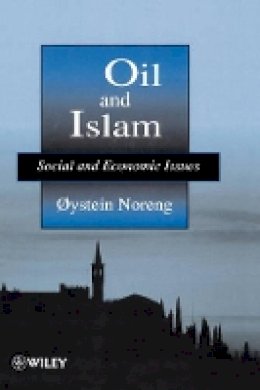
Stock image for illustration purposes only - book cover, edition or condition may vary.
Oil and Islam
Oæstein Noreng
€ 344.34
FREE Delivery in Ireland
Description for Oil and Islam
Hardcover. This volume examines the links between the changes in the oil industry in the Middle East and North Africa, and the growth of politically radical movements referring to Islam. It charts the rise in oil revenues in the 1970s and early 1980s, and the region's subsequent economic and social failures. Series: Petroleum Research Series in Petrolem Economics & Politics. Num Pages: 352 pages, black & white illustrations. BIC Classification: 1FB; 1HB; JFSR2; KCP; KNBP. Category: (P) Professional & Vocational; (UP) Postgraduate, Research & Scholarly; (UU) Undergraduate. Dimension: 242 x 164 x 24. Weight in Grams: 682.
During the 1970s and early 1980s, the Middle East and North Africa were perceived as being exceptionally successful, but now the region is viewed as a resounding economic and social failure. Islam is not only a religion, but also a political and social project. A major pretext of this work is to demonstrate how the tensions within Islamic movements feed directly into the economic, social, political, historical and religious arena of the region, and vice versa. An introductory chapter sets the context of the book. The core chapters of the book comprise an in-depth examination of the varied forms of oil revenue abuse. For examples, the past mismanagement of the tremendous wealth provided by oil. Following Islamic beliefs, revenue from oil should not finance wasteful consumption, but used instead for public welfare. Abstaining from interest calculations, there should be a case for keeping more oil in the ground. Indeed, oil has also stifled industrial development, and with declining oil revenues, the conflict between civilian and military priorities intensifies. While western interests have promoted arms spending, high population-growth expenditure reinforces the reality of the count-down to the post-oil era upon the Middle Eastern and North African oil exporters. So far the governments seem unwilling or unable to adapt and react. Furthermore, in the past oil has been used as a substitute for democracy. While the large oil revenues of the 1970s and early 1980s strengthened the position of autocratic rulers and weakened the private sector,repressive regimes have made Islam a source of criticism and opposition for the Western world. Following on from this, the book then looks forward to the problem of uniting the divergent interests in the spheres of oil and Islam into a cohesive whole. The book proposes that ideally Islamic governments would synchronise the depletion of oil reserves with investment in new productive assets. Islamic governments could also find ways to combine private, domestic and foreign interests in the oil industry. The main readership for this book will be policy-makers and professionals involved in development issues for Middle Eastern and North African affairs, and those with an interest in oil politics and Islamic studies.
Product Details
Format
Hardback
Publication date
1997
Publisher
John Wiley and Sons Ltd United Kingdom
Number of pages
352
Condition
New
Series
Petroleum Research Series in Petrolem Economics & Politics
Number of Pages
352
Place of Publication
New York, United States
ISBN
9780471971535
SKU
V9780471971535
Shipping Time
Usually ships in 7 to 11 working days
Ref
99-50
About Oæstein Noreng
Oæstein Noreng is the author of Oil and Islam: Social and Economic Issues, published by Wiley.
Reviews for Oil and Islam
